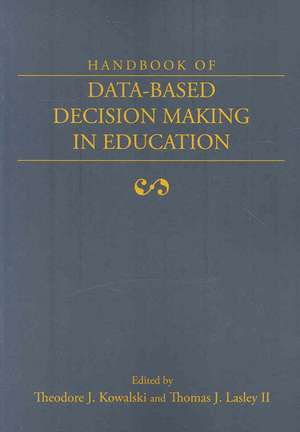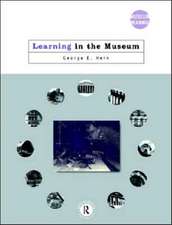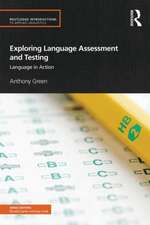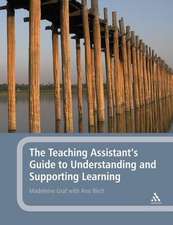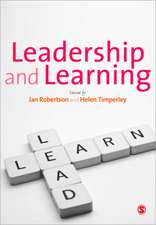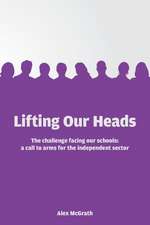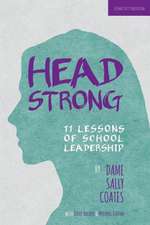Handbook of Data-Based Decision Making in Education
Autor Theodore Kowalski, Thomas J. Lasleyen Limba Engleză Paperback – 13 oct 2008
The Handbook of Data-Based Decision Making in Education is a must read for researchers who are just beginning to explore the scientifically based nature of educational practice. It is also appropriate for policy makers and practitioners who are confronted with young people who need to be in classrooms where "best practices" are the norm and not the exception.
| Toate formatele și edițiile | Preț | Express |
|---|---|---|
| Paperback (1) | 963.10 lei 6-8 săpt. | |
| Taylor & Francis – 13 oct 2008 | 963.10 lei 6-8 săpt. | |
| Hardback (1) | 1948.52 lei 6-8 săpt. | |
| Taylor & Francis – 13 oct 2008 | 1948.52 lei 6-8 săpt. |
Preț: 963.10 lei
Preț vechi: 1174.51 lei
-18% Nou
Puncte Express: 1445
Preț estimativ în valută:
184.28€ • 192.93$ • 152.49£
184.28€ • 192.93$ • 152.49£
Carte tipărită la comandă
Livrare economică 05-19 aprilie
Preluare comenzi: 021 569.72.76
Specificații
ISBN-13: 9780415965040
ISBN-10: 0415965047
Pagini: 512
Ilustrații: 46 tables and Following Food & Culture
Dimensiuni: 178 x 254 x 25 mm
Greutate: 0.95 kg
Ediția:New.
Editura: Taylor & Francis
Colecția Routledge
Locul publicării:Oxford, United Kingdom
ISBN-10: 0415965047
Pagini: 512
Ilustrații: 46 tables and Following Food & Culture
Dimensiuni: 178 x 254 x 25 mm
Greutate: 0.95 kg
Ediția:New.
Editura: Taylor & Francis
Colecția Routledge
Locul publicării:Oxford, United Kingdom
Notă biografică
Theodore J. Kowalski is professor and the Kuntz Family Chair in Educational Administration at the University of Dayton. A former superintendent and college of education dean, he is the editor of the Journal of School Public Relations, serves on the editorial boards of two other journals, and is the author of over 150 professional publications including 31 books. His most recent books are Effective Communication for School Administrators (2007), Case Studies on Educational Administration (5th ed., 2008), School Public Relations (4th ed., 2008), and Data-Driven Decisions and School Leadership (2008).
Thomas J. Lasley II is Dean, School of Education and Allied Professions at the University of Dayton. He has published in excess of 70 articles in professional journals and has authored or co-authored 11 books. He has served on a variety of regional and state level education commissions and boards including the Governor’s Commission on Teaching Success and the Ohio Board of Regents’ Planning and Accountability Committee. He co-founded the Dayton Early College Academy, a unique educational partnership between the University of Dayton and the Dayton Public Schools and is co-chair of the Teacher Quality Partnership.
Thomas J. Lasley II is Dean, School of Education and Allied Professions at the University of Dayton. He has published in excess of 70 articles in professional journals and has authored or co-authored 11 books. He has served on a variety of regional and state level education commissions and boards including the Governor’s Commission on Teaching Success and the Ohio Board of Regents’ Planning and Accountability Committee. He co-founded the Dayton Early College Academy, a unique educational partnership between the University of Dayton and the Dayton Public Schools and is co-chair of the Teacher Quality Partnership.
Cuprins
Part I Theoretical and Practical Perspectives; Chapter 1 Evidence and Decision Making in Professions, Theodore J. Kowalski; Chapter 2 Ethics Based Decision Making by Educational Leaders, Paul T. Begley; Chapter 3 Legal Dimensions of Using Employee and Student Data to Make Decisions, R. Lance Potter, Jacqueline A. Stefkovich; Chapter 4 The Role of Private Firms in Data-Based Decision Making, Patricia Burch, Tracy Hayes; Chapter 5 The No Child Left Behind Act, Timothy R. Konold, James M. Kauffman; Part II Building Support for Data-Based Decisions; Chapter 6 Preparing Educators to Effectively Use Student Data Systems, Jeffrey C. Wayman, Vincent Cho; Chapter 7 Accessing and Analyzing National Databases, Terrell Lamont Strayhorn; Chapter 8 Developing and Nurturing Resources for Effective Data-Driven Decision Making, Anthony G. Picciano; Chapter 9 Preparing Educators to Use Curriculum-Based Measurement, Robin S. Codding; Chapter 10 Principal Leadership, Data, and School Improvement, Michael A. Copland, Michael S. Knapp, Juli A. Swinnerton; Chapter 11 Building Data-Driven District Systems, Heather Zavadsky; Chapter 12 School System Strategies for Supporting Data Use, Amanda Datnow, Vicki Park; Chapter 13 Research on Teachers Using Data to Make Decisions, James Raths, Stephanie A. Kotch, Christine Carrino Gorowara; Chapter 14 Research and Evaluation on Data-Based Decisions in Education, Gregory J. Marchant, Sharon E. Paulson; Part III Data-Based Applications; Chapter 15 Using Data to Make Critical Choices, Thomas J. LasleyII; Chapter 16 Formative versus Summative Assessments as Measures of Student Learning, Robert J. Marzano; Chapter 17 Using Evidence to Support Administrative Decisions, Jane Hemsley-Brown; Chapter 18 Swimming in the Depths, Leanne R. Bettesworth, Julie Alonzo, Luke Duesbery; Chapter 19 Creative Decision-Making Strategies through Technology-Based Curriculum Tools, John Castellani, Deborah Carran; Chapter 20 Aggregating and Analyzing Classroom Achievement Data Supplemental to External Tests, John M. Burger, Brian Perry, Meghann Eagle; Chapter 21 Collaborative Inquiry and Data-Based Decision Making, Douglas Huffman, Kelli Thomas; Chapter 22 Evidential Reasoning and Decision Support in Assessment of Teacher Practice, Arthur M. Recesso, Sally J. Zepeda; Chapter 23 Data: The DNA of Politically Based Decision Making in Education, Bruce S. Cooper, John Sureau, Stephen Coffin; Chapter 24 Using Data to Assess School Culture, Theodore J. Kowalski, Tricia Browne-Ferrigno; Chapter 25 Data-Based Teacher Selection, I. Phillip Young; Chapter 26 Issues of Recruitment and Selection from a Data-Based Perspective, I. Phillip Young, Carol A. Mullen; Chapter 27 When Data are Insufficient to Make Group Decisions, Diane M. Dunlap, Renae E. Weber; Chapter 28 How NCLB has Affected the Practice of School District Superintendents, George J. Petersen, Larry L. Dlugosh;
Descriere
This forty-two chapter Handbook will be a major contribution to the literature of education. It will be a comprehensive, cross-disciplinary, research-based, and practice-based resource that all educators can turn to as a guide to data-based decision making.
